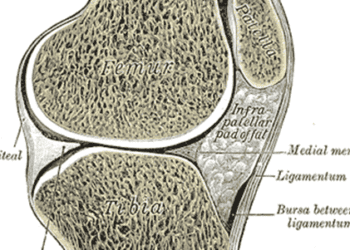Estrogen withdrawal associated with perimenopausal depression
1. Women with a history of perimenopausal depression experienced an increase in severity of depression after estrogen withdrawal.
2. These women reported avoidance of socialization, sleep disturbances, and decreased motivation following discontinuation of hormone therapy.
Evidence Rating Level: 1 (Excellent)
Study Rundown: Menopause denotes the permanent cessation of menstruation and is diagnosed when a woman experiences amenorrhea for 12 consecutive months. The average age of menopause in the United States is 51.2 years. Prior to menopause, women first enter the climacteric transition with a phase known as perimenopause, the average age of which is 46 years. During perimenopause, women may experience menstrual irregularities and symptoms such as hot flashes, sleep disturbances, vaginal dryness and mood changes. These symptoms are thought to be due to hormonal changes that occur when ovarian follicles are depleted. Often used to treat vasomotor symptoms, hormone replacement therapy (HRT) with estradiol can also improve mood among women experiencing perimenopausal depression (PMD). To date, the relationship between menopausal hormone changes and mood disturbances has not been well characterized. In the present work, the authors evaluated whether withdrawal of estradiol hormonal replacement therapy is linked to depression and whether this relationship is influenced by history of perimenopausal depression. Findings demonstrated that HRT withdrawal was associated with an increased severity of depressive symptoms among women with prior PMD. In light of the finding that estrogen withdrawal may affect women with past PMD differentially, clinicians should take special care to monitor the mental health of women in this category upon cessation of HRT.
Strengths of this study included randomized, double-blinded, placebo-controlled, parallel design trial. Limitations included small sample size, which may limit power, baseline differences in depressive symptoms between women with and without history of PMD and a short trial period. Further evaluation of longer-term outcomes in larger populations is warranted.
Click to read the study in JAMA Psychiatry
Relevant Reading: Hormones and menopausal status as predictors of depression in women in transition to menopause
In-Depth [randomized controlled trial]: This randomized trial evaluated the impact of discontinuance of HRT on depressive symptoms in postmenopausal women with and without histories of PMD. All participants received 100 ug/d estradiol transdermally for 3 weeks prior to randomization to continue estradiol (n = 27) or receive placebo (n = 29). The primary outcome of interest was depressive symptoms, as assessed by the Epidemiologic Studies Depression Scale (CES-D), Hamilton Depression Rating Scale (HDRS), Beck Depression Inventory (BDI) and visual analog scale (VAS). Secondary outcomes were the presence and severity of vasomotor symptoms.
Among women with past PMD, those randomized to placebo experienced increases in CES-D and HDRS depression severity ratings (p < 0.001 for both) and BDI scores (p = 0.05). They also experienced increased scores in depression (p = 0.01), avoidance of socializing (p = 0.03), early morning awakening (p = 0.04), and lack of motivation (p = 0.02) as measured by the VAS. There were no significant differences in vasomotor symptoms between groups.
Image: PD
©2015 2 Minute Medicine, Inc. All rights reserved. No works may be reproduced without expressed written consent from 2 Minute Medicine, Inc. Inquire about licensing here. No article should be construed as medical advice and is not intended as such by the authors or by 2 Minute Medicine, Inc.







